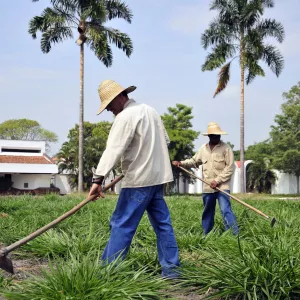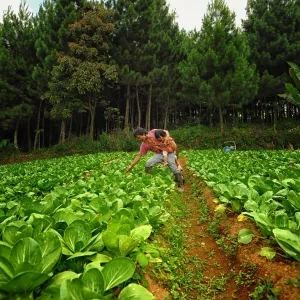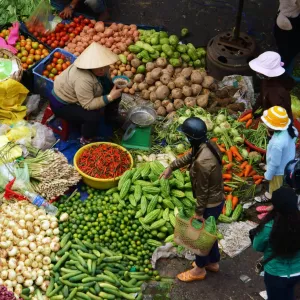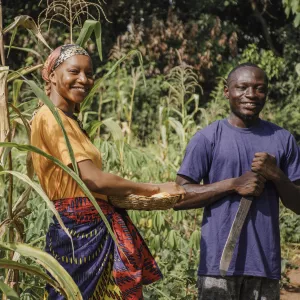Multifunctional Landscapes

Overview
We envision vibrant, diverse and healthy landscapes that are managed holistically to support sustainable and diverse eco-agrifood systems, resilient livelihoods and healthy diets while remaining within planetary boundaries.
In this vision, landscapes are co-created and managed by diverse stakeholders, who co-design technological, socioecological, and institutional innovations, engaged in policy processes, underpinned by inclusive governance and effective planning.
Our goal
Our work will contribute to
Where we work
Colombia, India, Kenya, Peru, Senegal, Tanzania, Tunisia, Vietnam, Zimbabwe
Challenges
Challenges we’ll address
- Unsustainable global food production and consumption patterns for a growing population.
- Environmental degradation and biodiversity loss which already account for 80% of deforestation and two-thirds of ocean pollution, while degrading 85% of wetlands and threatening more than a million plant and animal species with extinction.
Areas of work
Agroecology+ Solutions & Innovations
Agroecology+ solution bundles enhance food production and human diets, while supporting ecosystem restoration, biodiversity protection, and climate adaptation and mitigation. Integrating science-based experimentation with local knowledge, the Program applies agroecological principles and collaborates with stakeholders in target multifunctional landscapes to co-develop technological, socioecological, organizational and institutional innovations.

Landscape Optimization and Inclusive Planning
Actionable land- and water-use plans for multifunctional landscapes are informed by forecasting and modeling. To ensure landscape decisions help reconcile agricultural, conservation, livelihood and climate objectives, the Program works with partners and stakeholders in prioritized landscapes to co-develop inclusive landscape planning processes, scenarios, and shared visions. Spatial analysis tools such as Digital Twins are applied to optimize multifunctionality and assess trade-offs.

Business Models, Markets, and Sustainable Finance
The co-creation of knowledge on markets and consumer preferences provides incentives for the adoption of multifunctional landscape solutions. Options include green business opportunities, circular economy approaches, as well as economic and financial valuation of ecosystem services and disservices to support investment and long-term viability. The approach prioritizes demand-driven capacity strengthening of producer organizations and stakeholders so they can effectively respond to emerging market opportunities and sustainability requirements.

Governance, Institutions, Policy, and Inclusion
Evidence, tools and policy engagement support decision makers at all levels in managing inclusive multifunctional landscapes sustainably and advancing global biodiversity commitments. The Program integrates political economy and institutional analysis with capacity sharing and science-policy dialogue. Social science research develops strategies to address gender inequality and social exclusion. Continuous engagement and learning reshape research priorities in response to feedback, megatrends, and evolving stakeholder needs.
Performance Assessments & Evidence Generation
Co-developed assessment frameworks, stakeholder-centered knowledge systems, and AI-enabled digital monitoring tools, strengthen evidence–based decisions. Cross-CGIAR impact indicator frameworks are aligned and applied to evaluate landscape multifunctionality in collaboration with local to global stakeholders. Evidence is made accessible in knowledge hubs that enhance accessibility and usability of information for individual, institutional, and collective decision-making.

Our approach
Interlinked support across CGIAR’s portfolio
Our solutions contribute to various programs such as Climate Adaptation and Mitigation, Sustainable Animal and Aquatic Foods, Sustainable Farming, Policy Innovations, Better Diets and Nutrition, Scaling for Impact, as well as the Digital Transformation, Capacity Sharing, and Gender Equality and Inclusion accelerators.
Working to share our capacity with
- Farmers and extensionists
- National and subnational policymakers
- National agricultural research and extension systems (NARES)
- Private sector
Our expertise
- Expertise in scientific knowledge and research
- Experience in creating data science frameworks and decision support tools that allow for real-time monitoring of landscape interventions
- Global reach and extensive partnerships with local governments, NARES, NGOs, and the private sector
- Strong social capital through collaborations in prioritized countries, ensuring partners continue to be engaged in the co-creation and scaling of innovations
- Focus on aligning market and non-market systems with environmental goals
Events
News
-

Multifunctional Landscapes for Agroecological Transition and Climate Resilience
Insights from a Special Session at the 6th International Agronomy Congress during 24–26 November 2025 in New Delhi, India. The country, India has...
-

How Rice-Field Ponds are Forging Climate Resilient Livelihoods in Cambodia
In Cambodia, where rice is life, climate change is shaking the foundation. Intensifying droughts, falling prices, and unpredictable rainfall means...
-

How Indigenous Women in Mandla Are Safeguarding Livelihoods and Nutrition
Beyond income, smoked fish is woven into local food cultures. It is easy to store, quick to cook, and forms an important protein source for...
-

What 50 Years of Food Systems Research Reveal About Transformation
Over the past 50 years, CGIAR research has shaped how food systems are understood and transformed. This blog distils key insights from that body of...


